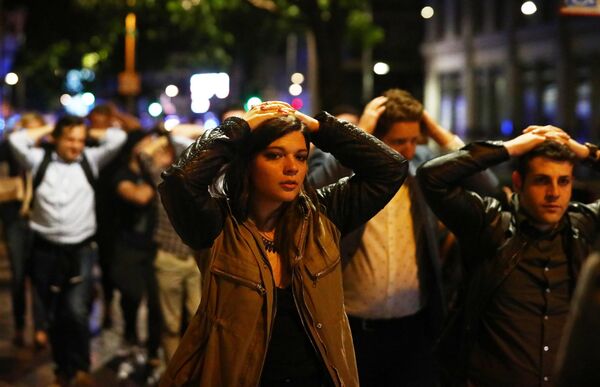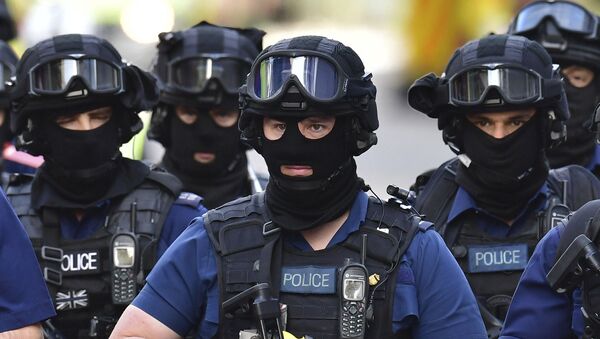There has rarely been an election in UK political history in which the two main parties have been so diametrically opposed in so many key policy areas, and security was a palpable demonstration of this momentous divergence.
Nonetheless, both May and Jeremy Corbyn made virtually identical statements on the subject — namely, that their opponent's policies had made, or would make, Britain less safe.
Keeping our country safe should be the number one priority for any Prime Minister and any Government. pic.twitter.com/8uysNnVIep
— Theresa May (@theresa_may) June 5, 2017
May claimed Corbyn had a record of cozying up to extremist elements — Corbyn slammed May's pursuit of an ever-closer relationship with key international terrorism sponsor Saudi Arabia, and pledged to cut all UK arms exports to the Wahhabism-exporting Kingdom.
WATCH: Jeremy Corbyn responds to Theresa May's latest desperate U-Turn on Britain's security#VoteLabour #GE2017 pic.twitter.com/fyCsz5vyEJ
— Scott Nelson (@SocialistVoice) June 8, 2017
May said Corbyn's steadfast refusal to use Trident under any circumstances made him unfit to be prime minister — Corbyn retorted that avowed Conservative willingness to launch a nuclear first strike was a threat not just to Britain, but the world itself.
We need to have some difficult conversations, starting with Saudi Arabia & other Gulf states that have funded and fuelled extremist ideology pic.twitter.com/dZuGWbcAYL
— Jeremy Corbyn (@jeremycorbyn) June 4, 2017
The list went on — and for Professor Anthony Glees, Director of Buckingham University's Center for Security and Intelligence Studies, it's clear voters were unconvinced by the security credentials of either.
When will @realDonaldTrump be Tweeting his congrats to Ms May? What's keeping him? https://t.co/egVmPMWtBe
— Anthony Glees (@AnthonyGlees) June 9, 2017
"Security policy failings on both sides almost cancelled each other out — if either, particularly Corbyn, had had a better, clearer security policy offer they could have won last night. May's weakness on the issue was clearly highlighted following the Manchester and London Bridge attacks, and Corbyn rightly made political capital out of the many failures directly associated with her during her time as Home Secretary and as Prime Minister," Professor Anthony Glees, Director of Buckingham University's Center for Security and Intelligence Studies.
Theresa May responsible for security failures of London Bridge, Manchester, Westminster Bridge. Should be resigning not seeking re-election pic.twitter.com/2o0odey2BQ
— steve hilton (@SteveHiltonx) June 5, 2017
Corbyn was not the only one to tear into May following the London Bridge attacks. Steve Hilton, ex-Prime Minister David Cameron's former policy guru, called on her to resign due to "security failures" — suggesting her spell as Home Secretary, during which there was a 20 percent drop in the number of armed officers between 2010 and 2016, an overall reduction of 20,000 police officers and police budgets were slashed by 18 percent, had made the country more dangerous.
For his part, Corbyn said the attacks demonstrated that it was impossible to "protect the country on the cheap."

Still, Professor Glees notes Corbyn's security stances provided May with an open goal of her own.
"She effectively exploited Corbyn's core weaknesses on defense — on top of his support for Hamas, Hezbollah and the IRA, she highlighted how his stated approach for dealing with terrorism was always via negotiation, not strength or military measures. Had he been better on security, he might've been in Downing Street now," he continued.
To cling on to power, May is prepared to do deals with a partner that looks to have committed a criminal offence. https://t.co/Mt08xLcgBD
— Jo Maugham QC (@JolyonMaugham) June 9, 2017
Nonetheless, while May has managed to hang on to power by way of an informal coalition agreement with the DUP Echoing the sentiments of many analysts, Professor Glees believes May's government will be "weak and unstable."
"She has lost both the political and moral authority to shape Britain's government. Her fragile coalition is a sticking plaster for a very serious problem, and this is going to impact the UK's security in a big way. Weak governments attract trouble — Francois Hollande's administration in France looked feeble and indecisive, and terrorists exploited this for their own ends. Never forget that Islamists read newspapers just like everyone else," Professor Glees concludes.


